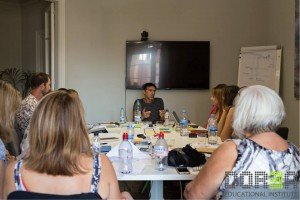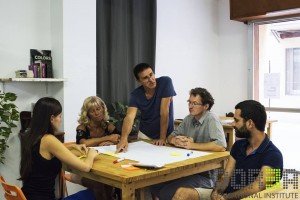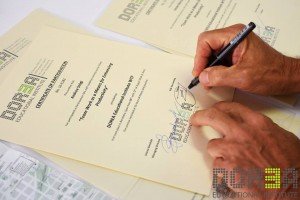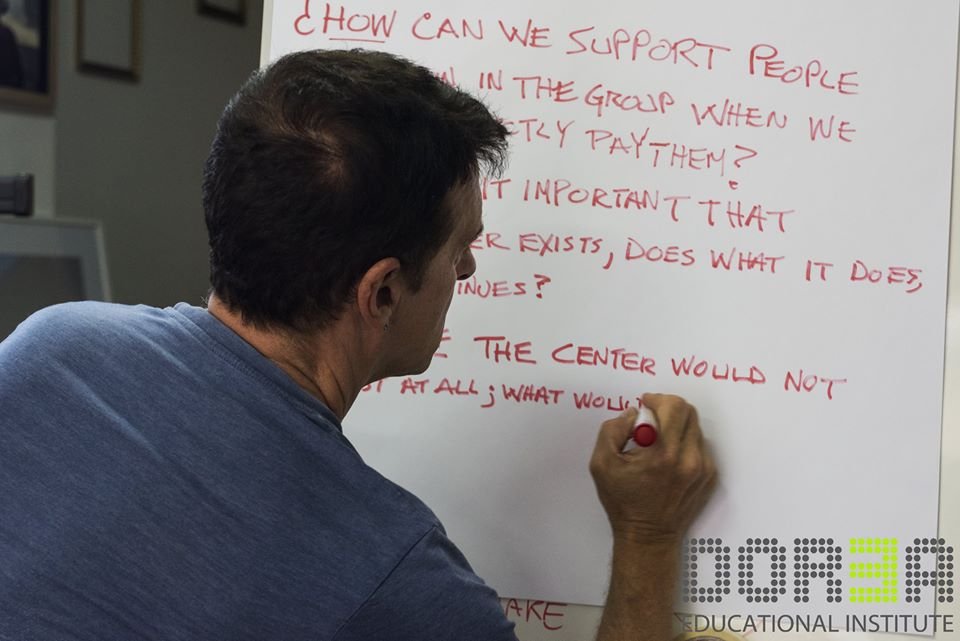Helping others to embrace their full potential

Erik is a serial social entrepreneur (basically, he can’t stop thinking about how to improve people’s lives and society, and how to repair the planet). He has worked in the building of projects, organisations, and world movements. He is a co-founder of Ireland’s national training centre for sustainability, “Cultivate”, where he designed, facilitated and delivered a diverse menu of trainings between 2000 and 2007. Currently he is teaching the course about Teamwork and Productivity in Barcelona organised by DOREA.
If you think about the Erasmus+ Mobility Program which three words come to your mind first?
Friendly, Random, Useful
In your opinion which three topics are the most urgent in nowadays life/situation/globe/world?
Transition to a new paradigm and system, ecosystem repair, reclaiming government from the 1%
You have produced several projects for youth; two of them are called ‘Strength in Diversity’ and ‘Cultivate Community’. Could you show us the connection between diversity and community?
Community is inclusive, or otherwise it is dysfunctional. Diversity means many solutions to shared problems, and many inspirations to take the community in new and better directions. Both require self-knowledge, communication and empathy, collaboration and openness in order to thrive. Diversity of course is not a thing, but a quality.
‘Strength in Diversity’ brought together young people marginalised by mainstream Irish society. They built community within their group, and then brought stories about shared experiences out to their peers in mainstream schools.
Cultivate Community was a massive street party, launched to help a wide diversity of Dublin’s communities to come together and experience sharing of cultures through food, music, dance and a dedicated youth-culture area featuring a temporary (competition quality) skate park, BMX and break dancing.


Interdisciplinary: Which fields of disciplines have you immersed during your life? How can you combine these fields?
Design, Visual Art, Biology, Ecology, Policy, Learning and Education, Grassroots organizations, NGOs, Campaigns, Communications, Writing, Storytelling, Sustainability, Permaculture, Social Innovation, Social Entrepreneurism…I’m sure I have missed a few…
They flow and blend together. They are all tools in my personal tool kit. I mix and match according to what I may be working on at the time. I use them all.
Is it an easy task to be an environmentally friendly entrepreneur? What kind of challenges do you need to face with?
No, it is not easy. But when you become aware of what is happening in our world, you have few choices available: try to ignore and forget what you know, become angry and cynical, or do what you can to transform the problems into solutions; to become a healer. Challenges include poor economic support, stress from “knowing too much”, difficulty in providing better alternatives within a system designed to squash all competition, societal expectations that people doing “good work” should not need to live from it..
Why did you choose to be a trainer? Why did you choose the topic of teamwork?
Why I became a trainer in the first place? It’s because I have always enjoyed the learning process, and helping others to embrace their potential. Teamwork is a subject I understand very well, after many years of helping to build teams, organizations, and a few global movements. If the team doesn’t function well, the entire project will fail. Most people have never learned how to create community and build teams. So this is something I can offer in support.


Could you please give an advice for the future generation how to be more conscious about their environment and how to change their lifestyle?
Our world is changing very fast. On one hand, it is suffering the collapse of many systems (ecosystem, food system, economic system, climate system…), while on the other hand there are millions of people getting organized across the planet to create massive transformation of all those failing systems
I’m sorry to say that simply becoming more conscious will not save us. But when that increased consciousness is linked to action, we have hope of creating something far better than the dying system ever gave to us. It’s the same with lifestyle. Small changes will not be enough (they never were). So a changed lifestyle will begin with a very personal question: “What is the most loving, courageous, creative and essential thing I can do now?” And then start to act on it.
Prepared and edited by Flóra Fierpasz

